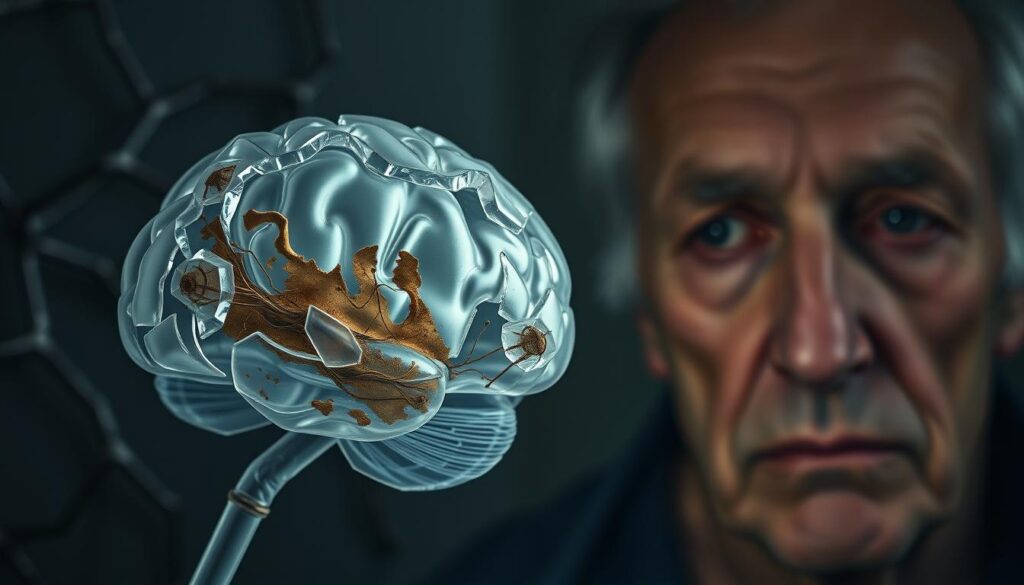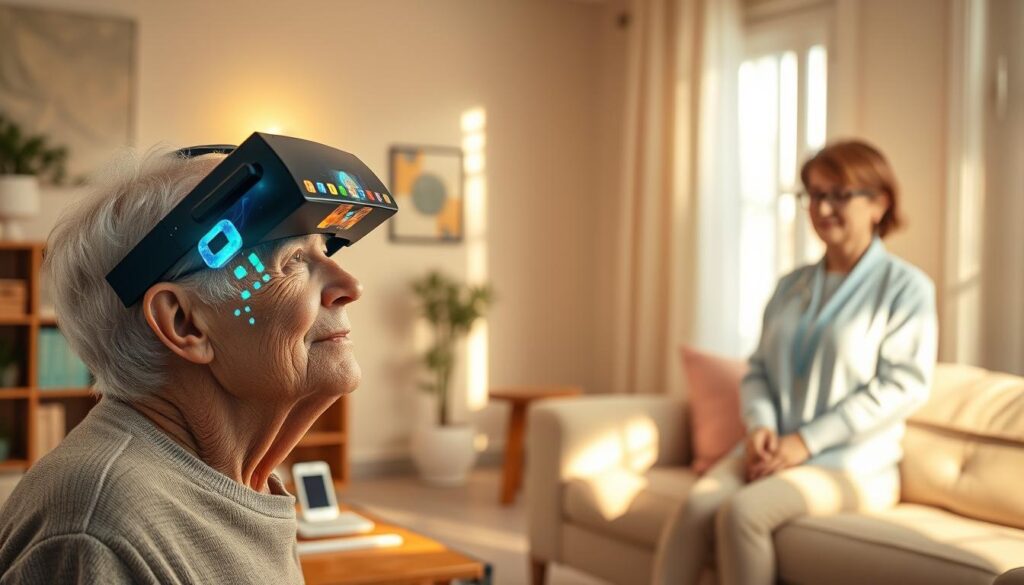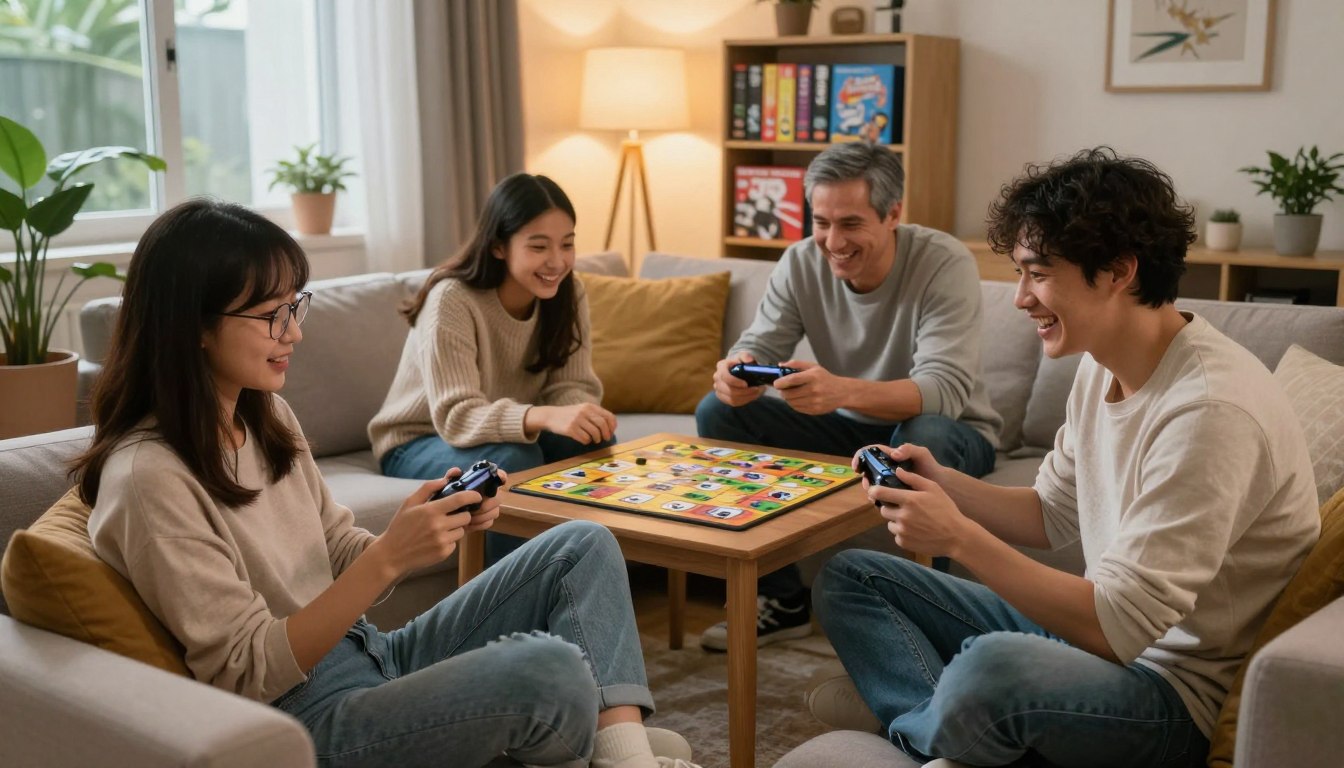Anúncios
Can virtual reality really change how we help Alzheimer’s patients? As more people get this disease, we need new ways to help. Virtual reality games might be the answer. They offer fun, immersive experiences that could improve memory and focus.
Let’s look closer at how virtual reality is changing care for Alzheimer’s patients.
Anúncios
Understanding Alzheimer’s Disease and Cognitive Decline
Alzheimer’s disease is a common neurocognitive disorder that gets worse over time. It affects memory, attention, and how well someone can make decisions. The World Health Organization says millions worldwide are living with dementia, which is often caused by Alzheimer’s.
As people get older, they often see their thinking skills get worse. This can be very hard for them and their families. It’s important to understand Alzheimer’s because it can also lead to other mental health issues.
It’s key to find ways to help people with Alzheimer’s. This includes finding new treatments and ways to improve their lives. It also helps families feel less stressed and worried.
Anúncios

The Role of Cognitive Stimulation in Alzheimer’s Care
Cognitive stimulation is key in Alzheimer’s care. It’s a non-pharmacological approach that works well. Activities designed to challenge the mind help keep it sharp. They also encourage social interaction, improving life quality for those with cognitive decline.
Therapy focused on cognitive stimulation targets memory, problem-solving, and more. Research shows it can lead to better results than medication. It’s all about meaningful interactions that keep patients engaged and attentive.
Adding cognitive stimulation to Alzheimer’s care shows real benefits. It boosts mental skills and emotional health. Patients enjoy activities that make them feel good and involved.

Using cognitive stimulation in therapy is a hopeful approach for Alzheimer’s patients. It focuses on non-medical ways to care for the mind and heart. This holistic approach improves overall well-being.
Introduction to Virtual Reality Technology
Virtual reality technology is changing the way we experience things. It offers immersive experiences that feel real. Users can enter a virtual world, leaving the real one behind.
This technology is great for therapy. It helps people with cognitive issues by creating simulations that challenge their minds. These virtual worlds feel so real, they help patients improve their conditions.
Therapists use VR to help patients practice skills in a safe space. This approach is key to their recovery. As VR gets better, it will help even more in therapy.
Cognitive VR Stimulation for Alzheimer’s
Cognitive VR stimulation is a new way to help Alzheimer’s patients. It uses virtual reality to create fun, engaging experiences. These experiences help improve important thinking skills.
It’s important to understand how VR works. This knowledge helps create treatments that meet each patient’s needs.
The Mechanisms of VR in Cognitive Rehabilitation
VR creates a special space for improving thinking skills. It works in several ways:
- Personalization: VR experiences are made just for each patient. This makes them more effective.
- Immersive engagement: VR’s real-like scenarios grab attention. This makes tasks more fun and interesting.
- Adaptive difficulty: Tasks get harder little by little. This keeps the challenge right, keeping patients engaged.
Benefits of VR in Engaging Alzheimer’s Patients
VR brings many benefits, making therapy more fun. Key advantages include:
| Benefit | Description |
|---|---|
| Enhanced Motivation | VR’s fun environments make patients want to do tasks. This boosts their motivation. |
| Improved Social Interaction | VR games that let you play with others help patients feel less alone. |
| Increased Adherence to Therapy | VR is so enjoyable that patients stick with it. This leads to better results from therapy. |
Types of Virtual Reality Games for Cognitive Enhancement
Virtual reality has changed how we train our brains with new VR games. These games are made to help people with Alzheimer’s improve their thinking skills. There are two main types: cognitive training VR programs and interactive games. Both help improve our brains in different ways.
Cognitive Training VR Programs
Cognitive training VR programs aim to boost specific brain skills like memory and attention. They use exercises that have been shown to work well. Players do tasks that get harder as they get better, keeping them engaged and improving their skills.
The fun, immersive world of VR makes these tasks more enjoyable. This makes it more likely for people to keep playing and learning.
Interactive VR Games
Interactive VR games offer a fun experience with exciting stories and challenges. They keep players thinking by needing quick responses. These games also help people meet and work together in virtual worlds.
This mix of fun and brain work makes these games great for people with Alzheimer’s. They offer a fun way to keep the brain active.
How VR Games Improve Memory and Attention
Virtual Reality (VR) games are changing the game in treating Alzheimer’s. They use immersive worlds to help improve memory and focus. Studies show VR can really help those with Alzheimer’s manage their symptoms.
Case Studies of Successful VR Interventions
Many studies prove VR games boost memory and focus in Alzheimer’s patients. For example, a study found patients did better at remembering things and moving around in virtual spaces. Another study showed older adults could concentrate better and switch tasks faster after using VR.
Research Findings on VR Effectiveness
Research backs up VR’s benefits for Alzheimer’s patients. A detailed review of studies found VR activities greatly improve cognitive skills. One study found people who used VR for specific tasks remembered better and reacted faster.
The Impact of Virtual Reality on Executive Functioning
Executive functioning includes key skills like planning, organizing, and solving problems. For those with Alzheimer’s, these abilities often weaken, making everyday tasks hard. Virtual reality (VR) offers new ways to improve these skills through fun and engaging exercises.
Studies show VR can help Alzheimer’s patients a lot. It lets them practice real-life skills in a safe, virtual world. This way, they can work on important tasks without feeling overwhelmed.
VR games help patients get better at planning and organizing. For example, they might manage virtual grocery lists or tidy up a virtual kitchen. These games make learning fun and help patients do things on their own again.
More research is needed to fully understand VR’s benefits. But, it’s clear VR can help Alzheimer’s patients a lot. It makes them more independent and improves their quality of life. As VR technology gets better, it will likely play an even bigger role in helping those with Alzheimer’s.
Utilizing VR for Daily Living Skills in Alzheimer’s Patients
Virtual reality offers a new way to help Alzheimer’s patients improve their daily skills. It lets them practice real-life tasks like cooking and shopping in a safe space. This way, they can keep their skills sharp without the stress of everyday life.
VR programs help Alzheimer’s patients stay independent by practicing daily tasks. They get to learn by doing, which boosts their confidence. This shows how VR can change lives for the better, helping those with Alzheimer’s to stay active and independent.
Experience and User Engagement with VR Games
Understanding how user engagement metrics help us see if VR apps work is key in cognitive rehab. Things like game design, how easy it is to use, and making it personal all matter. These insights show how well users connect with VR, which is vital for keeping Alzheimer’s patients’ minds active.
User Engagement Metrics in VR Applications
User engagement metrics cover how well users interact with VR apps. They look at how long users play, how often they interact, and if they finish tasks. These numbers tell us how involved users are and if they’ll keep playing.
By tracking these, developers can see where users might get stuck and how to make it better.
Strategies to Enhance User Experience
Using smart strategies can make VR apps more fun and useful. One great way is to adjust the game’s difficulty to fit each player’s skill level. This keeps users interested without getting too hard.
Adding feedback, like rewards or prompts, makes the game feel more real. This makes the experience better for everyone.
By using these strategies, we can help Alzheimer’s patients get more out of VR therapy. It makes the experience more rewarding and keeps their minds active.
Barriers to Implementing VR in Cognitive Therapy
Using virtual reality in cognitive therapy is not easy. It faces many challenges that stop it from being used more. These challenges include making VR technology available and training caregivers to use it.
Technology Accessibility Issues
Getting VR technology is hard for both patients and caregivers. Not every healthcare place can buy and keep up with VR systems. Patients also need special hardware and space, which can be hard to find.
This makes VR therapy hard to get for some. It creates unfairness in how care is given.
Training Requirements for Caregivers
Caregivers need good training to use VR therapy. They must learn how to use VR systems and work with patients. Without proper training, caregivers might not use VR, which limits its benefits.
By improving training, caregivers can better help patients. This leads to better results from VR therapy.
The Future of VR in Alzheimer’s Care
The future of VR in Alzheimer’s care looks bright. It offers many new ways to keep minds active. As tech gets better, VR games made just for therapy are becoming more common. They use better graphics and make it easier for users to interact, helping keep minds sharp.
Innovations in VR Game Development
New VR games are being made just for Alzheimer’s patients. They use smart technology to adjust to each person’s abilities. This makes the games more fun and helps patients feel more connected and motivated.
Potential for Broader Applications
VR isn’t just for Alzheimer’s care. It can also help with other brain problems, like injuries or diseases. This shows VR could change how we help people in many ways, helping doctors and caregivers too.
| Innovations | Applications |
|---|---|
| Adaptive Gameplay | Personalized Cognitive Therapy |
| Immersive Environments | Emotional Engagement |
| Interactive Mechanics | Memory Enhancement |
| Real-Time Feedback | Progress Tracking in Rehabilitation |
Conclusion
Virtual reality (VR) games in cognitive therapy are a big step forward for Alzheimer’s patients. VR offers a special way to keep minds active. It helps with memory, attention, and even daily tasks.
More research on VR could lead to better treatments for Alzheimer’s. Studies show VR can make therapy more fun and effective. It’s important for doctors and researchers to work together to improve VR therapy.
VR is a key part of treating cognitive disorders without drugs. It makes life better for Alzheimer’s patients and opens new doors in care. Using VR could change how we treat Alzheimer’s and improve the lives of those with it.
FAQ
What is virtual reality (VR) and how is it used for Alzheimer’s patients?
Virtual reality (VR) creates immersive environments through simulations. It’s used for Alzheimer’s patients to improve memory and focus. It offers engaging experiences that stimulate their minds.
How does VR technology help in improving cognitive functions in Alzheimer’s patients?
VR technology offers personalized and interactive experiences. It focuses on training memory and problem-solving skills. This can significantly boost cognitive abilities.
What types of cognitive stimulation activities can VR provide for Alzheimer’s care?
VR offers various activities like cognitive training and interactive games. These tasks are designed to keep patients engaged and active.
Are there any studies that support the effectiveness of VR interventions for Alzheimer’s?
Yes, studies show VR improves memory and attention in Alzheimer’s patients. They highlight significant cognitive gains from VR use.
What are the challenges in implementing VR technology for Alzheimer’s therapy?
Challenges include making VR accessible to patients and caregivers. Training healthcare professionals is also crucial. Overcoming these hurdles is key to successful VR therapy.
What future developments can we expect from VR technology in Alzheimer’s care?
Future VR may include better game design and graphics. It could also offer more interaction, making therapy more effective. VR might also help with other cognitive issues.
How does cognitive stimulation compare to pharmacological methods in Alzheimer’s treatment?
Studies show cognitive stimulation, like VR, may improve more than drugs. It can enhance the quality of life for Alzheimer’s patients.
What role does user engagement play in VR applications for cognitive rehabilitation?
User engagement is vital in VR therapy. Good design and personalized experiences boost engagement. This leads to better outcomes for Alzheimer’s patients.




